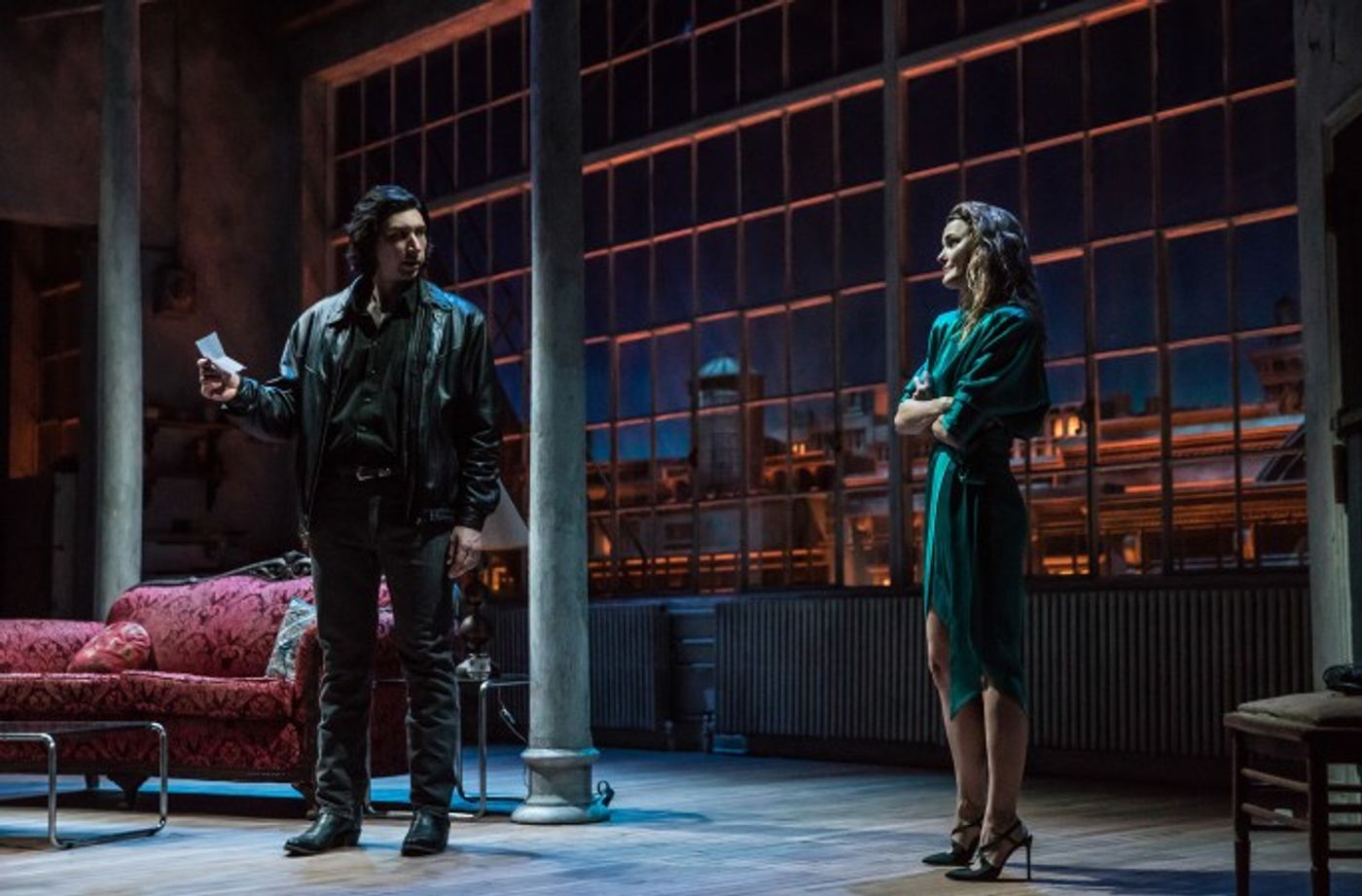Review: Adam Driver and Keri Russell Star in Lanford Wilson's Drama of Sex and Grieving, BURN THIS
The phrase "toxic masculinity" wasn't exactly in the vernacular in 1987, when Circle Rep's buzz-producing mounting of Lanford Wilson's Burn This moved uptown to Broadway. So perhaps coked-up, homophobic, violently aggressive, possessive bullies were considered sexier than they are now.

(Photo: Matthew Murphy)
But if the unsavory behavior of the play's leading male character Pale (he got the nickname from a cognac bottle) stands out as unacceptable for contemporary viewers, the focus for both the playwright and for late 1980s audiences was more on the story of two people, polar opposites, bonding over mutual grieving and perhaps finding a reaffirmation of life through sex.
Despite its complete avoidance of the subject, Burn This has been described as Lanford Wilson's AIDS play. The epidemic was finally being recognized as a national issue by the time of its Broadway run and perhaps some things just didn't need to be mentioned.
Director Michael Mayer's generally well-acted production begins with an impressive visual, set designer Derek McLane's striking depiction of a downtown Manhattan loft apartment in what was once an industrial building, featuring square footage for days, tall windows offering a sweet view of the city and warmth provided by a parade of steam radiators lining a wall.
Kerri Russell gives a fine, thoughtful performance as Anna, a dancer and aspiring choreographer who has just lost her best friend and artistic collaborator, Robbie, when he and his boyfriend perished in a boating accident. Anna and Robbie shared the loft with former dancer turned Madison Avenue wonk Larry. The funeral made it clear to them that most of Robbie's family was unaware of his sexual orientation, treating Anna as his girlfriend.
To contemporary audiences, Larry may stand out a bit as a familiar wise-cracking gay character in a play otherwise populated with straight people, but Brandon Uranowitz never comes off as a stereotype while tossing out culturally elitist barbs ("You don't ask why with Wagner.").

(Photo: Matthew Murphy)
There's an empathetic sadness to David Furr's performance as Anna's boyfriend, Burton, a successful science fiction screenwriter who dreams of creating more meaningful work. The actor's reactions and observations hint that perhaps Burton knows his artistic dreams surpass his talent, just as he seems aware of the lack of passion he stirs in his romantic partner, which may account for his occasional posturing as the heroic white night that Anna doesn't want or need.
Into this mix enters Robbie's brother Pale, a New Jersey restaurant manager who is nearly a double for him in looks, but certainly not in demeanor. Arriving unannounced to pick up his brother's belongings, Wilson provides the character with a flourishingly abrasive entrance, spewing out his hatred of the city, calling Anna a bitch and referring to Larry and Robbie as faggots. Later on, he sucker-punches Burton.
As originated by John Malkovich, Pale had a soft intellectual streak that layered his outrage and perhaps fascinated Anna. You could believe that Pale was crying for help. As played now by Adam Driver, he's a thuggish bulldozer, more likely demanding attention as he rants and begging for sympathy when his body can't withstand the effects of his drug abuse. There is little texture and why the mature, introspective Anna is lured to him is never quite apparent.
Above all, he always seems a threat, and even if Anna, as the months go on, finds herself drawn to the danger, going as far as to create a dance piece about their relationship, it's discomforting to watch her rebuilding her life into one that includes him.
Turning down a safe haven is one thing. Diving head first into the fire is another matter.
Reader Reviews
Powered by
|
Videos

